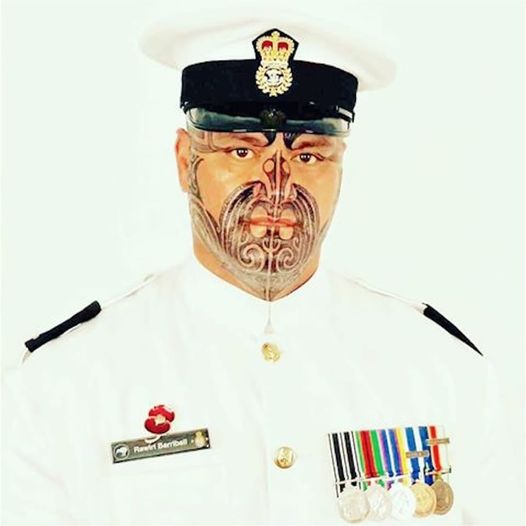Rawiri Barriball : The Māori Sailor . A centuries-old tradition has been overturned in New Zealand, rewriting history in both military and cultural terms. On July 23, 2025, the Royal New Zealand Navy announced that sailor Rawiri Barriball has been officially permitted to wear his moko kauae (chin tattoo) and mataora (full-face tattoo) while on duty. This decision represents a striking shift away from rigid grooming codes, recognizing the sacred significance of Māori cultural identity within the nation’s armed forces.
For generations, strict military appearance standards often meant erasing or covering cultural markers. Tattoos, especially those on the face, were historically deemed inappropriate within formal institutions like the navy. For Māori, however, moko kauae and mataora are not mere decorations. They carry deep genealogical, spiritual, and social meaning. Each pattern tells a story of ancestry, leadership, and connection to the land. By allowing Barriball to serve proudly without compromising his heritage, the navy has acknowledged that professionalism and cultural pride can coexist.
The Power of Representation
This moment goes beyond one sailor’s personal journey. For the wider Māori community, the decision is a milestone in reclaiming space within institutions that once pressured them to assimilate. It reflects New Zealand’s broader efforts to honor Te Tiriti o Waitangi (the Treaty of Waitangi) and embrace cultural inclusion at the highest levels of public life.
Representation matters deeply in military service. Seeing a sailor in full uniform adorned with moko signals that Māori traditions are not only respected but woven into the identity of modern New Zealand. It sets a precedent for other armed forces worldwide, where Indigenous soldiers may still feel pressured to suppress visible expressions of heritage.
Barriball’s breakthrough also raises questions about how cultural identity shapes belonging within rigid organizations. By loosening centuries-old rules, the Royal New Zealand Navy has made history, sending a message of respect, equality, and pride in diversity.
A Legacy for the Future
This decision will likely be remembered as a turning point in how New Zealand balances tradition with progress. For young Māori considering a career in the navy, it serves as a reminder that they no longer have to choose between service and identity. For the world, it highlights how cultural acceptance can strengthen—not weaken—discipline and unity.
Rawiri Barriball’s moko kauae and mataora are now more than personal symbols; they are a living testament that cultural heritage and modern service can march side by side.


